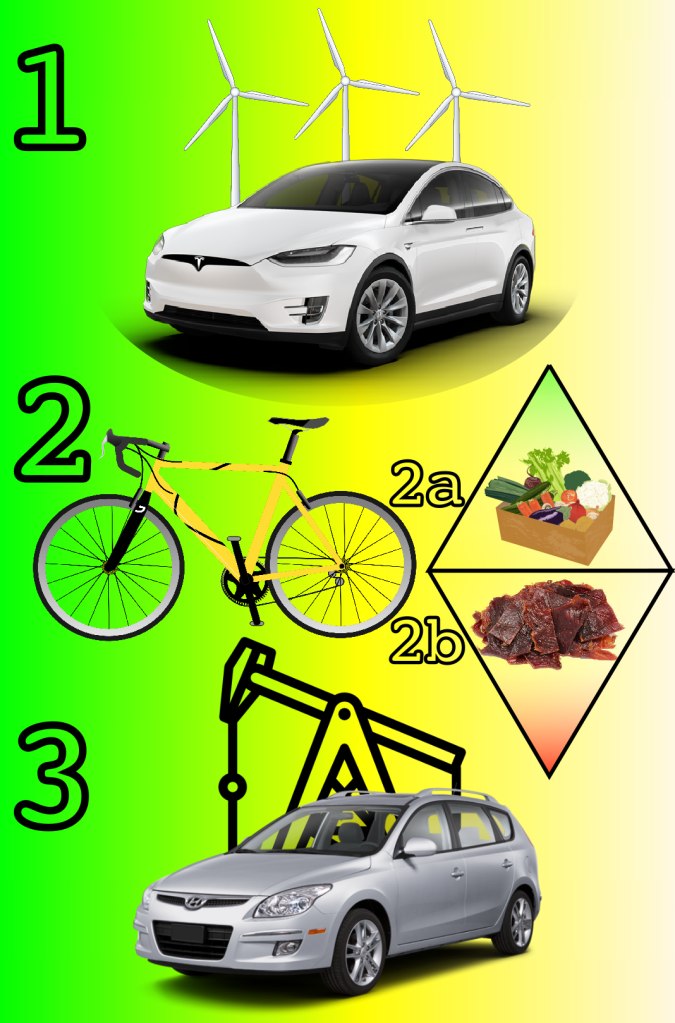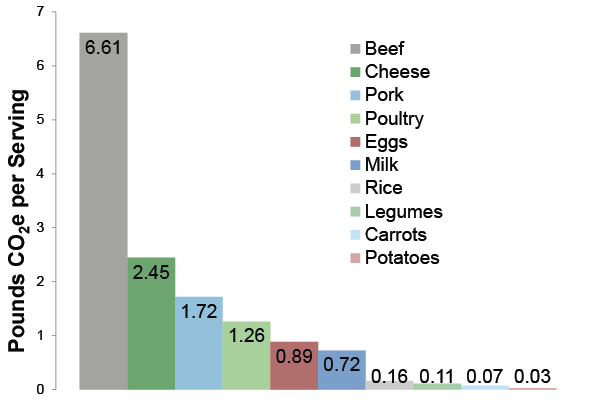I’m a big fan of reflecting on past and crafting yearly resolutions. I’ve dedicated posts to daily habits, yearly goals, and adjusting goals during the pandemic work-from-home era. I called this “caterpillar season” and in reflection, this season carried me through much of 2021. Prior to the omicron wave, Illumina began thoughtfully asking employees to come back onsite. Which I loved! A significant part of back to normal for me is my daily bike-commute and work-from-work! Let’s end “caterpillar season” and focus on new goals for 2022! #GetVaccinated
Particularly in 2022 I can focus and spread my friend’s challenge! The challenge to save the world:

How does not eating red meat save the world? My buddy explained how choosing chicken (white meat) over beef can reduce my dietary carbon footprint in half! The University of Michigan Center for Sustainable Systems explains that “beef’s [Green House Gas] emissions per kilogram are 7.2 times greater than those of chicken.”
Removing beef from my diet eliminates that huge grey bar in the graph above! Going vegan would eliminate the first 6 bars altogether! I consider not eating red meat as a vegan stepping-stone, and a welcoming challenge!
When this vegan buddy visited southern California, we explored many excellent plant-based restaurants. I was floored at how tasty some of the non-meat and non-dairy entrées where! I ought to applaud my UW-Madison pals who graduated in Food Science; thanks for making soy delicious!
Also, I found it’s simple to choose vegan! Maybe it’s a southern California hip-restaurant thing, but my eyes opened to the vegetarian, vegan, and/or gluten-free menu sections. Generally, restaurants carry less options here, but the silver lining is: less options = less decision making! (Just like ordering at Chipotle or shopping at Trader Joes.)

This food expedition opened my appetite to vegan options with such little friction. The options were always there, and now, I immediately dart my attention to the vegan or vegetarian menu sections and order! Simple!
Meatless Monday:
Maybe I can’t convince you to join in this YEARLY challenge with me, but perhaps I can get you to say the words “Meatless Monday” to yourself once a WEEK. Why not on Mondays!?
The Meatless Monday video campaign is terrific and deserves multiple viewings to grasp the gravity of opting-out of meat once a week. A notable line I think of often, “by skipping one burger a person can save 10 bathtubs full of water.”
Once more: 1 BURGER = 10 BATHTUBS!
On my daily bike-commute, I ride by an In-N-Out, which is always full of customers. After watching the Meatless Monday video, I can’t help but look at everyone’s burger as 10 bathtubs of water. It’s a wild visualization.
So that’s the simplicity of it. Challenging myself to “save the world” by not eating red meat in 2022! I invite you to join me, try a non-meat entrée (Impossible Whopper!), and/or embrace Meatless Monday!
But seriously there are 7 billion people in the world… how can I, alone, make a difference? Time to turn to others, what are they doing?
Jeff Bezos and Climate Week NYC:
Well, Jeff Bezos pledged 10 billion dollars to support climate change efforts from his Bezos Earth Fund. This fund is structured in 3-parts: Conservation, Restoration, and Food Transformation.
Bezos announced 1 billion dollars of the fund to the conservation arm at Climate Week NYC 2021. And an additional 1 billion committed to both restoration and food transformation efforts during COP26. 3-parts, 1 billion allocated to each from Bezos’ 10 billion dollar fund. Exciting!
I see the philanthropic $s from Bezos as a sign that efforts are balanced to save the world. However, Climate Week NYC’s website, which lists 80 events from the 2021 week in September, suggests imbalance. A simple histogram for the categories of events from Climate Week identifies a disproportionate importance towards Finance, Policy, and Environmental Justice. Only 2 events related to Food!?

Allow me to give the benefit of the doubt… I don’t know Climate Week NYC’s participants, organizers, or connections. Also, I acknowledge this may be a case of sampling bias. Regardless, the talk-the-talk of Bezos vs the walk-the-walk of Climate Week NYC gives me a very unclear picture. Especially when I ask “what can I do?”
Personal Carbon Footprint:
This final part is conceptually mind-numbing to me. As my work routine gets back to normal, how does my daily commute impact carbon emissions? The scenario is distilled from Randall Hamlet’s calculations inside this Green Car Report post.
The situation is how I choose to commute to work and my resulting CO2 emissions. I have three options:
Option 1: electric vehicle
Option 2: road bike
Option 3: gas-powered car
Let’s say the electric vehicle recharges from a wind-powered energy grid, while my road bike recharges from my diet.
Option 1 and 2 are arguably very conscious towards my CO2 footprint. Especially when compared to Option 3, driving my gas-powered car, right?
Well, the variable I brushed past is how I recharge from the bike-commute: Food! So, after choosing Option 2: road bike, I now have 2 more decisions on how to refuel those lost calories:
Option 2a: vegan meal
Option 2b: beef jerky

In this choose-your-own-adventure, guess the CO2 emissions of eating meat vs vegan after a bike-commute. How does that food decision compare to driving a gas-powered car?
Get this, the CO2 emissions of commuting to work with Option 2: road bike and eating Option 2b: beef jerky is HIGHER than driving my gas-powered car!!!
This is mind-exploding!! I hypothesized Option 2: road bike would be the least CO2 emitting mode of transportation, which is true, before you consider refueling lost calories. Eating beef after my bike-commute has a higher carbon footprint than driving a gas-powered car to work!

Final Thoughts:
Now, time to humpty-dumpty my exploded brain pieces back together… In 2022, I’m going to:
- Be conscious of what I eat. Practice what I preach and preach: “Don’t eat red meat”, “Meatless Monday”, and/or “I’ll have the vegan option”!
- Pay attention to how wealthy donors and influential organizations are fighting climate change. Listen to non-food related climate activism and learn. But, from my final commuting scenario, I can’t see how food isn’t the most important factor!
- Bike-commute to work and choose vegan options to refuel calories!
- Save the world in 2022! (ha, at least try)

Love this post, Steven! Just recently watched a video that went over that carbon footprint graph! Have you tried Huel? A bunch of my friends use it to replace a couple meals every day and it’s vegan!
LikeLike
Thanks Kayla! 🙂 Ah, I wasn’t aware that graph was so popular! It certainly showcases a strong point for avoiding red meat and/or animal products. You should share the video here if you’d like!
I had a buddy gift me Soylent a few years back, my initial search suggests Huel is similar? New to me! Any interest in using Huel in any upcoming recipes!?
LikeLiked by 1 person
Here it is! https://www.youtube.com/watch?v=F1Hq8eVOMHs
Ooh yeah I think they’re kinda similar. I don’t think they’ve used the name brand Soylent but they used to make their own cheap version and now they’re hooked on Huel haha nope! I do actually think they have their own recipes on their website though lol
LikeLiked by 1 person
Woah excellent video! Great recommendation! Thanks!!
Fascinating stuff! Before I start making recipes with Huel, I’m going to make your Cheesecake Stuffed Raspberry Cookies 😳 omg they look so good! https://brokenovenbaking.com/cheesecake-stuffed-raspberry-cookies/
LikeLiked by 1 person
Love this post! This is a wonderful dive into personal carbon footprint. I think the main disconnect you found is the difference b/t personal vs. total carbon footprint. Most of the carbon emitted is not under our control, such as industry (breakdown by sector is here:
https://www.epa.gov/ghgemissions/sources-greenhouse-gas-emissions)
Also Project Drawdown has exhaustively covered the best ways for us to reduce ppm’s of CO2 in the atmosphere, (my favorite way of saying “mitigate/reverse climate change”) and the relative size of each benefit!
https://drawdown.org/
In the case of agriculture (10% of total emissions), much of the carbon/methane is generated by the way the food is grown. Factory farming is the reason beef emissions are so high – trucking the grain & cows (and drugs, among other things) in, and trucking the waste and meat out – is far more carbon intensive than having the herds graze and fertilize a pasture. And nearly 90% of cows’ methane “production” (off-gassing?) can be prevented by incorporating kelp into their diets.
This is why I think policy is such a key lever! It can alter the economic incentives to more quickly transition each sector to less carbon intensive practices, which will further reduce footprint for each individual as well. But in the meantime, while we wait (or lobby!) for such action, individual solutions are also a great lever to influence companies with our collective buying habits. No way burger joints would be scrambling to implement meatless patties if there wasn’t a large perceived consumer market!
I also don’t want to sound too contrarian, as I have tried to adopt similar practices! Less meat is an easy solution with a large impact to personal carbon footprint, and there are so many ways to enjoy delicious veggies! My personal favorite is a good buffalo cauliflower “wing”.
Would love to chat more about this with you, and sorry for the rant ^_^
LikeLiked by 1 person
Thanks Mr. Kelbel! Ah, yes, you’ve beautifully summarized my subtext frustration! I had drafted a paragraph highlighting the personal vs. total carbon footprint, but the numbers were a bit depressing. Indeed, there’s a lot an individual can NOT control, I didn’t want to make it sound like any single efforts are insignificant…
On that note, I really like the Drawdown Framework for Climate Solutions graphic breaking down sector-specific broad actions! https://drawdown.org/drawdown-framework
Yes! I was introduced to this cow seaweed diet from Science Friday, very cool application: https://www.sciencefriday.com/segments/feeding-cattle-seaweed-reduces-greenhouse-gas-emissions-by-82-percent/
On the topic of emissions from trucking agriculture, Kayla’s comment below included a great video! I’ll re-add it here: https://www.youtube.com/watch?v=F1Hq8eVOMHs
I don’t find this contrarian at all! I know you’ve actively pushed for climate policy in the past so thanks for your perspective of the big picture! I’m learning as much as I can here! I do enjoy the notion that individual demand can collectively force markets to change their behaviors; sounds like policy can advocate for this behavior, now!
Thanks again for the thoughtful comment!
LikeLiked by 1 person